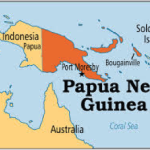A confirmed case of imported measles arrived in Cairns by air on Sunday 12 October 2014 from Port Moresby, PNG. The patient attended Cairns Hospital Emergency Department on Sunday 12 October between 1130 and 1530, and on Monday 13 October, between 1730 and 2030.
Earlier in July 2014, two other children arrived in Cairns from PNG and were seen at a medical centre and pathology, radiology, and then at Centrelink, and were later diagnosed with Measles.
This highlights the dangers of acquiring Measles and other infectious diseases in your home town from travellers from neighbouring countries. Cairns is but a 90 minute flight from PNG and so is highly at risk of imported infections such as measles and tuberculosis, which are common in PNG.
Vaccination is the most effective means of controlling further spread of measles. Everyone born after 1966 should be opportunistically offered vaccination – especially people born between 1970 -1980 where immunity rates are lower. The vaccine is free from the Queensland Health Immunisation Program and in some other states as well.
Anyone who develops a cough, conjunctivitis, rash and fever, should stay at home until the diagnosis is excluded, as people can be infective from 5 days before until 4 days after the onset of the rash. Call your local GP and arrange an assessment. When proper infectious disease precautions are taken, spreading the infection is less likely.
For More Information, visit here.
Dr Catherine Meehan, Cairns
PLEASE NOTE: This alert was released shortly after the above article was written.
| Statewide Measles Alert |
| 24 October 2014Please disseminate to all Health Care Providers within one (1) working day
Health practitioners are asked to be alert for measles cases in travellers from various overseas locations in South-east Asia and the Pacific region. There have been 8 confirmed cases of measles in people in the past week who were exposed to measles while travelling in Bali, Myanmar and the Solomon Islands. There have been 63 measles notifications in Queensland year-to-date which is 3.5 times the five year YTD mean. Please ask about overseas travel, particularly to Bali, Myanmar, Papua New Guinea and the Solomon Islands, in all suspected measles cases. Be Prepared for People with Measles Presenting Measles transmission can occur readily in medical and associated settings. When a patient with suspected measles attends a medical facility, contacts (other patients/staff at the facility) may be at risk of acquiring the infection. To minimise the risk of transmission within facilities:
Management of Measles in a Clinical Setting
Ask if the patient has been overseas or in contact with a confirmed case in the last 3 weeks (note that lack of history of travel does not exclude measles). If the case does not satisfy the clinical criteria, or if the person has received 2 doses of a measles vaccine, measles is less likely.
Pre-travel Vaccination Health practitioners are encouraged to check the vaccination status of anyone intending to travel to South-east Asia or the Pacific region (or any other country with known measles cases circulating) and to provide measles vaccination to those not fully vaccinated. Travel to Bali is particularly common during the summer months, especially during schoolies week. A measles fact sheet and other measles resources are available at: www.health.qld.gov.au/cdcg/index/default.asp Please also consider opportunistic vaccination for any unimmunised patients attending for any reason. Authorised by Dr Alun Richards, Acting Senior Director, Communicable Diseases Unit. |
